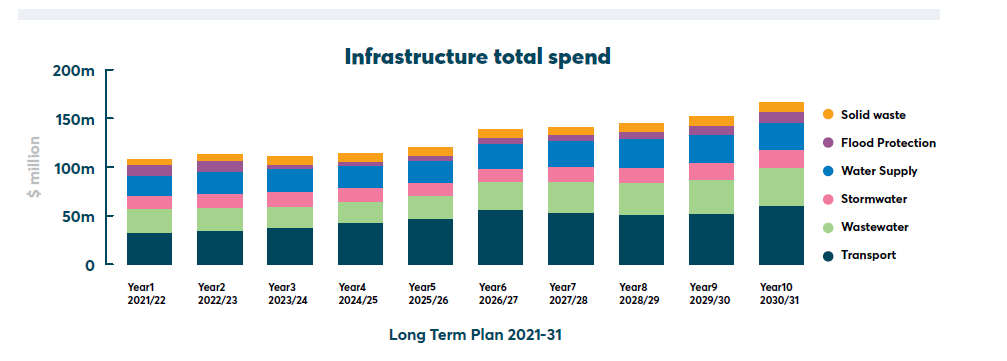Council is responsible for managing and maintaining a range of critical infrastructure that enables our city to keep functioning effectively. This includes transport, solid waste, water supply, wastewater, stormwater and flood protection.
Our approach to decisions around infrastructure is one of balance. We manage existing infrastructure, assessing and maintaining the condition of assets, and monitoring performance. As demands for infrastructure change with demographic shifts, population growth and land development, the levels of service required from our assets similarly change. This must be balanced against our ability to pay for it (Our Financial Strategy).
To guide this work we have developed an Infrastructure Strategy which supports this Long Term Plan. This Strategy identifies the requirements for Nelson’s infrastructure over the next 30 years, noting that some assets will last for much longer than that. It assesses the challenges facing our assets and how Council can respond to them.
The main objective of this Infrastructure Strategy is to assess the resilience of all Council infrastructure assets, considering climate change and projected sea level rise. Simultaneously it delivers on environmental outcomes, by acknowledging central government initiatives focused on improving fresh water and ecosystems, and reducing carbon emissions. Council also needs to maintain and renew existing assets in a way that enables growth and development and contributes to a more sustainable transport culture.
There are a variety of changes that the 2021 Infrastructure Strategy has had to address compared with the 2018 Strategy:
- Council’s infrastructure work programme makes an important contribution to Nelson’s economy. Therefore expanded capital works programmes are being undertaken to act as an economic stimulant. The increased capital works programme will help mitigate the impact COVID-19 has had on Nelson’s economy, which has affected growth and revenue forecasts, in the medium term
- Variations to the rate of population growth, which will change the levels of demand for new infrastructure, including housing intensification across the City
- The projected impacts of climate change, which require us to assess our assets and undertake work to make them more resilient or adaptable to changing rain patterns, the increased likelihood of flood events and sea level rise.
Over the next 30 years, the approach to manage the key issues include:
Increase resilience to natural hazards and climate change
- Council will continue to investigate and develop strategies relating to the impacts from natural hazards and climate change. This includes Climate Change Vulnerability Assessments and continuing with the Natural Hazards Assessments. Funding has been set aside over the thirty year programme for the implementation of these strategies.
Maintain, renew and upgrade existing assets in a cost-effective way
- Council will be proactively focusing on improving its understanding on the condition of its assets. This includes improved data collection and analysis, modelling, CCTV inspection and condition assessments. This work will inform renewal strategies and provide a consistent basis for prioritising renewals and upgrades to Council’s infrastructure.
- As referred to in the Infrastructure chapter, a large portion of the water and wastewater network will need to be renewed. Significant funding has been allowed for over the next 30 years to manage this surge.
Provide infrastructure to enable growth
- As referred to in Council’s activity summaries, Council will be significantly investing in infrastructure to enable growth within the region.
- The project objectives for the Nelson Future Access project are to develop a detailed multi-modal transport system investment programme that supports community aspirations for a thriving CBD; a healthy environment; and provides a safe, accessible and resilient transport system, whilst meeting growing demand for travel. After considering the Government spending priorities set out in the GPS and Waka Kotahi’s funding constraints, it is possible that over the next 10 years Nelson will not see any additional funding to support the delivery/outcomes of the final business case.
Maintain or improve public health and safety and environmental outcomes.
- Council will be developing monitoring programmes to help better understand the water quality within the stormwater network. This data will be used to inform a stormwater quality treatment strategy. Funding has been set aside over the next thirty years for the implementation of this strategy in both the stormwater and transport programmes.
- Council will continue to invest in reducing wastewater overflows and improving the water quality within the Maitai Dam.
Further information on these works can be found in Council’s activity summaries.





